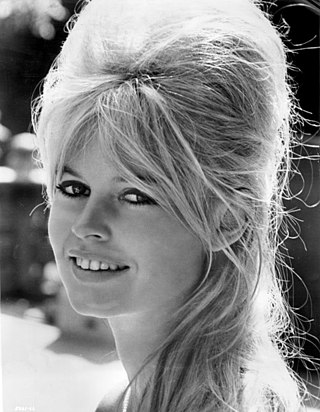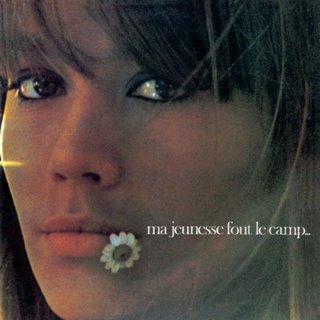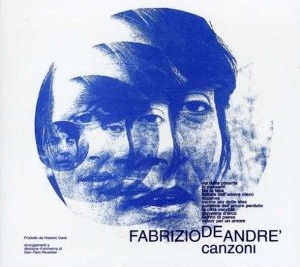Related Research Articles

Brigitte Anne-Marie Bardot, often referred to by her initials B.B., is a French animal rights activist and former actress, singer, and model. Famous for portraying sexually emancipated characters, often with hedonistic lifestyles, she was one of the best known activists in the sexual revolution of the 1950s–1970s. Although she withdrew from the entertainment industry in 1973, she remains a major popular culture icon and a noted figure in ushering in the sexual revolution. She has acted in 47 films, performed in several musicals, and recorded more than 60 songs. She was awarded the Legion of Honour in 1985.

Georges Charles Brassens was a French singer-songwriter and poet.

Juliette Gréco was a French singer and actress. Her best known songs are "Paris Canaille", "La Javanaise" and "Déshabillez-moi" (1967). She often sang tracks with lyrics written by French poets such as Jacques Prévert and Boris Vian, as well as singers like Jacques Brel and Charles Aznavour. Her 60-year career came to an end in 2015 when she began her last worldwide tour titled "Merci".

Georges Moustaki was an Egyptian-French singer-songwriter of Jewish Italo-Greek origin. He wrote about 300 songs for some of the most popular singers in France, including Édith Piaf, Dalida, Françoise Hardy, Yves Montand, Barbara, Brigitte Fontaine, Herbert Pagani, France Gall, Cindy Daniel, Juliette Gréco, Pia Colombo, and Tino Rossi, as well as for himself.
"C'est si bon" is a French popular song composed in 1947 by Henri Betti with the lyrics by André Hornez. The English lyrics were written in 1949 by Jerry Seelen. The song has been adapted in several languages.

Mistral gagnant is a studio album from French artist Renaud on the Virgin France label, now part of EMI, released in 1985.

Putain de camion is a studio album from French artist Renaud, released in 1988 by Virgin France.

Morgane de toi is the sixth studio album from French artist Renaud, recorded in Canoga Park, Los Angeles, California, with American session musicians. It was released in 1983 under the Polydor label, and a remastered version was reissued in 2000, with a high-fidelity version appearing on Blu-ray in 2013.

Volume 1 is the second studio release by Italian singer-songwriter Fabrizio De André and his first true studio album. It was first issued in 1967 on Bluebell Records. It is a collection of re-recordings of De André's early singles, previously issued on the Karim label.

"Là-bas" is a 1987 song recorded as a duet by the French singer Jean-Jacques Goldman and the British-born artist Sirima. It was the second single from Goldman's 1987 double album Entre gris clair et gris foncé. It was a smash hit in France and became a popular song throughout the years.

The social attitudes toward and legal status of breastfeeding in public vary widely in cultures around the world. In many countries, both in the Global South and in a number of Western countries, breastfeeding babies in open view of the general public is common and generally not regarded as an issue. In many parts of the world including Australia, some parts of the United States and Europe, along with some countries in Asia, women have an explicit legal right to nurse in public and in the workplace.

Henriette Ragon, better known as Patachou, was a French singer and actress. She was an Officier of the Légion d'honneur.

Ma jeunesse fout le camp... is the seventh studio album by French singer-songwriter Françoise Hardy, released in November 1967 on Disques Vogue. The title is very idiomatic, but it in English its general meaning is 'My youth is slipping away'.

Comment te dire adieu is the ninth studio album by French singer-songwriter Françoise Hardy, released in 1968 on Disques Vogue. Like many of her previous records, it was originally released without a title and came to be referred to, later on, by the name of its most popular song. The cover artwork was a drawing by Jean-Paul Goude.

Canzoni is the seventh album released by Fabrizio De André. It was issued in 1974 by Produttori Associati and reissued several times by Ricordi and BMG. Uniquely for a De André release, eight of the album's eleven tracks are covers or translations; the final track, "Valzer per un amore" ["Waltz for a love"], is De Andre's vocal version of an instrumental waltz by composer Gino Marinuzzi, entitled "Valzer campestre" ["Country Waltz"]. According to De André's recollections, a 78-rpm record of the song was playing in his mother's house as he was being born. The other three tracks are re-recording of early compositions which De André originally recorded in the early Sixties, when he was signed to Karim. The album's peculiar structure is mainly the result of De Andre's record label at the time wanting to release a "filler" album, in the same vein as his 1968 collection Volume 3.

"Renaud chante Brassens" is an album by French singer Renaud featuring cover versions of the songs of Georges Brassens. The original songs date from between 1952 and 1961. Public reaction to Renaud's reprises was generally positive even from Brassens fans. It was to be the last Renaud album for some six years until his rehabilitation from a period of alcoholism and his massive renewed success with Manhattan-Kaboul.

Agnès Bihl is a French singer.

Human to animal breastfeeding has been practiced in some different cultures during various time periods. The practice of breastfeeding or suckling between humans and other species occurred in both directions: women sometimes breastfed young animals, and animals were used to suckle babies and children. Animals were used as substitute wet nurses for infants, particularly after the rise of syphilis increased the health risks of wet nursing. Goats and donkeys were widely used to feed abandoned babies in foundling hospitals in 18th- and 19th-century Europe. Breastfeeding animals has also been practised, whether for perceived health reasons – such as to toughen the nipples and improve the flow of milk – or for religious and cultural purposes. A wide variety of animals have been used for this purpose, including puppies, kittens, piglets and monkeys.

"Mistral gagnant is the title song from French singer Renaud's 1985 album Mistral gagnant. In the song, Renaud sings to his young daughter Lolita Séchan about his own childhood and realizes that time flies as will fly away the laughs of his daughter as a child.
"Le Gorille" is a 1952 song by Georges Brassens, found on his album La Mauvaise Réputation. It was also released as a single, with La Chasse Aux Papillons as B-side.
References
- 1 2 "Untitled Page". Georges-brassens.com. Retrieved 30 April 2021.
- ↑ Dicale, Bertrand (2016-05-04). Dictionnaire amoureux de la chanson française. Place des éditeurs. ISBN 9782259250900.
- ↑ Lamy, Jean-Claude (October 2014). Brassens le mécréant de Dieu. Albin Michel. ISBN 9782226306081.